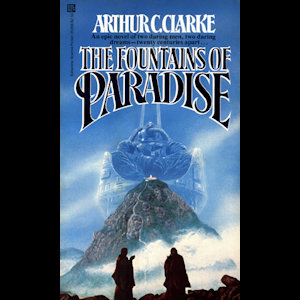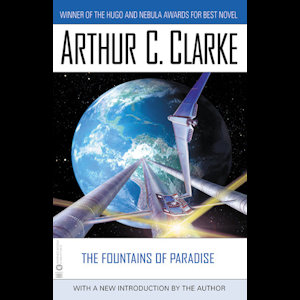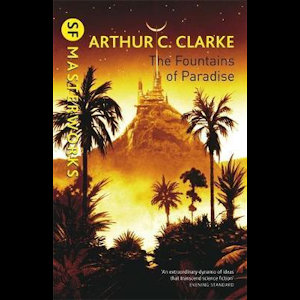The Summer of Arthur C. Clarke: The Fountains of Paradise
Before I begin, welcome to my Summer of Arthur C. Clarke. On the heels of last year's popular Slasher Summer, this year I'm leaving behind the guilty pleasure of the niche horror genre and exploring something a little closer to my own heart: namely science-fiction. Of all the sci-fi greats, none have influenced me more than the late Arthur C. Clarke, my personal favorite of the "Big Three" from the Golden Age of the genre (Asimov, Clarke, and Heinlein). This summer, I am going to look at a few of his most famous works, including the entirety of his 2001 series and the tiny handful of adaptations that have been made for film, television, and video games. Strap in and prepare yourselves for a journey into the stars and the mind, and let us never forget how much richer the world of fiction is for having been blessed by the incomparable Sir Arthur C. Clarke.
 | | A weirdly abstract interpretation |
Though not as well-known as Childhood's End, 2001, or even Rendezvous with Rama, The Fountains of Paradise is nonetheless one of Clarke's most important works. Clarke afficianados have an unfortunate tendency to refer to it as "the space elevator one," but such reductionism is unfair to what might just be Clarke's most personal novel, and easily one of his best.
Winning both the Hugo and Nebula, The Fountains of Paradise tells the tale of Vannevar Morgan, an aging architect in the twenty-second century unsatisfied with his already legendary reputation for building a bridge across the Strait of Gibraltar. His latest magnum opus vision is to create the world's first space elevator, a tower between the surface of the Earth and a space station in geosynchronous orbit, and the novel details many of the hurdles--political, religious, personal, and technological--he must leap over in order to succeed.
Set on the equatorial island of Taprobane--a not-as-fictionalized-as-you-think version of Sri Lanka, where Clarke lived most of his life--this is more than just an earnest advocacy text for how a space elevator would revolutionalize humanity in the near future. This is a surprisingly romantic tale that pulls from both history and science, even digressing into communications with aliens, to offer a glimpse of not just how Arthur C. Clarke thinks, but how he feels about life itself. Indeed, one of the book's strongest secondary characters, enthusiast retiree Johan Rajasinghe, is the closest Clarke ever comes to putting himself directly into one of his stories.
 | | That's not even close to where Taprobane is supposed to be |
It's also wonderfully written and competently plotted. As with Rendezvous with Rama, Clarke finds a way to frame his story around a central premise--this time, the planning and construction of the space elevator--and the story evolves logically from that framework, complete with conflict, drama, and even a nail-bitingly good climax. Granted, one of the book's most compelling conflicts--that of Morgan's technological ambitions being pitted against the stubbornness of an unwavering religious sect who lay claim to the only piece of real estate suited to be the anchor point for his elevator (described by one character as the proverbial unstoppable force meeting an immovable object)--is rather cheaply and inexplicably solved by the single wildest bit of narrative convenience you'll find in Clarke's entire canon.
It also takes quite a long time to get a feel for when, exactly, the story is taking place. A few interlaced chapters early on are set in antiquity, telling the interesting but all-too-abruptly concluded tale of King Kalidasa, an architectural visionary in his own right responsible for his own technological marvel in the titular Fountains of Paradise. Then it leaps into the indeterminate future story of Vannevar Morgan before interlacing more historical anectdotes set in the Twenty-First Century. It eventually becomes possible to figure out when the story is taking place, but it's needlessly obtuse for at least the first half of the novel.
 | | This cover captures it, methinks |
Still, despite a handful of flaws, I must reiterate how well-done The Fountains of Paradise is. Whereas you'll find awe and inspiration in almost all of Clarke's novels, this one reveals something more akin to love, as Clarke's descriptions of the land's sordid past, its ancient monuments, and the character of the people who live there (including offering an unusual level of empathetic understanding for the more spiritual, religious people) are so poetically and intricately described that they can only be the result of his love for his newly claimed homeland. This is especially true when you read his afterword and discover how much of it is based on reality.
It's also safe to say that the space elevator is a technological concept for which Clarke would become known--many people even carry the false belief that he invented the idea to begin with--and here it is completely intertwined with his love for Sri Lanka. In the novel, as Morgan does his best to convince everyone of the rightness of his vision, it's hard not to read his words in Clarke's own voice. While I take exception to labeling this novel as nothing more than "the space elevator one," I can't deny that this novel, more than any other novel ever written, is responsible for popularizing the concept.
That said, the reason this isn't just a book about a space elevator is because there's so much more to it than that. The elevator is ultimately just a MacGuffin, and if you want to understand Clarke's futurist ideas about technology, there are plenty of other books to recommend, including his non-fiction. However, if you want to feel close to Clarke, the man, The Fountains of Paradise is the book you absolutely must read. The fact that its also one of his most narratively mature is really just a bonus.
-e. magill 8/2/2018
THE UNAPOLOGETIC GEEK'S
SUMMER OF ARTHUR C. CLARKE: | |
|
|
|